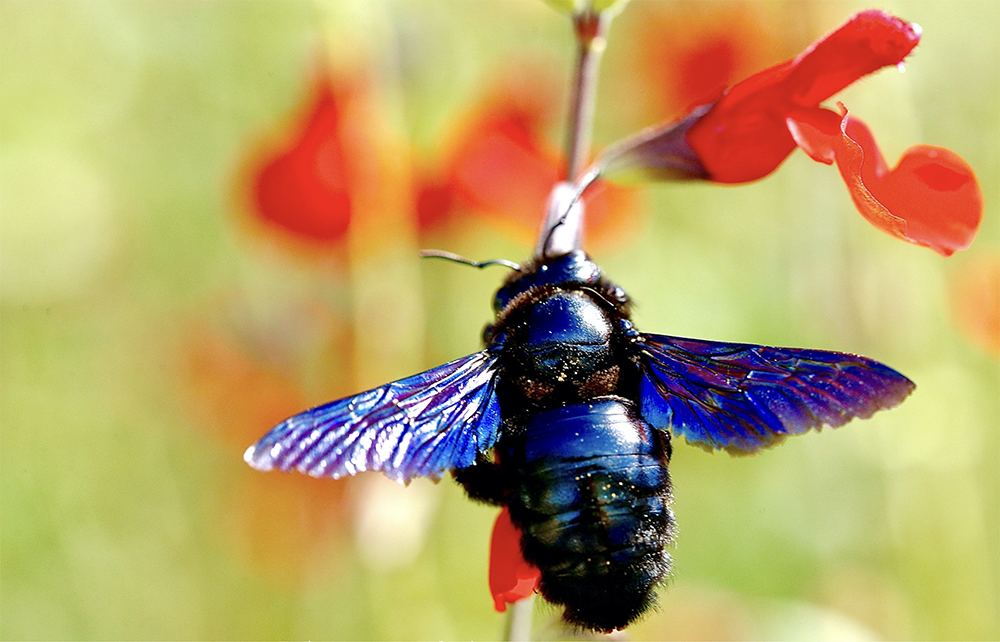Blue orchard bee
Mason said that in order to guide a child’s whole person, we must fully understand what it means to offend not, despise not, hinder not. Other aspects in the field of education might evolve over time, but this vocation is absolute.
About bob
What is the blue orchard bee?
While honeybees are what everyone thinks of when they consider the “typical” bee, the rise of colony collapse has brought attention to the diversity of bees and the need to understand and nurture that diversity. The blue orchard or mason bee is a less well-known, native bee. Scientists are just now learning to understand the place of this bee in the ecosystem. Rather than living in hives, blue orchard bees live in solitary cavities, forming cocoons to overwinter. They do not make honey, but are essential spring pollinators and beautiful creatures in their own right. They are “atypical” in a honeybee-loving world and they have their own unique requirements for life.
It seems fitting to consider that some people are like blue orchard bees living in a honeybee-loving world. These people may have a diagnosis or they may just seem different. Nothing seems to work. Everyday activities are frustrating for reasons you can’t quite understand. Even when there is a diagnosis, the challenges can be difficult to adequately address. This is in part because environments and methods are designed for those with neurotypical development even though our world is neurodiverse. Unfortunately, this doesn’t work very well for those with neuroatypical or neurodivergent development. This would be like a blue orchard beekeeper raising their bees in a honeybee hive that is surrounded by summer blooms. Neurodivergences can include various combinations of learning disabilities, ADHD, autism, anxiety, and more.
These differences are often invisible and may be misunderstood as character flaws. If you only knew honeybees and came upon a blue orchard bee, you might think something was terribly wrong! Contrary to this misunderstanding, however, is the understanding that God intended a neurodiverse world, that “He arranged the parts just as He wanted them to be” (1 Cor 12:18), and that each individual has gifts and challenges that are particular to their identity. To properly steward these gifts and challenges, however, they must grow wholly and relationally. Therefore, the manner in which we guide their education must wholly and relationally consider their differences.
Mason said that in order to guide a child’s whole person, we must fully understand what it means to offend not, despise not, hinder not. Other aspects in the field of education might evolve over time, but this vocation is absolute. The Blue Orchard Bee is the location of CMI’s online resources for those living out this vocation with neurodivergent students. Consistent with the model of the PNEU, CMI will build community, support the observation of the children, navigate current research, and reflect on our vocation. We are excited to share this journey with you, as we learn how to relate to our blue orchard bees.
“Take heed that ye OFFEND not – DESPISE not – HINDER not – one of these little ones.” – Charlotte Mason in Home Education p.12

how to relate to our blue orchard bees
Get started with our resources
The Blue Orchard Bee is the location of CMI’s online support for those living out this vocation with neuroatypical children. Consistent with the model of the PNEU, CMI will build community, support the observation of the children, navigate current research, and reflect on our vocation.
We are excited to share this journey with you, as we learn how to relate to our blue orchard bees.
ONLINE COMMUNITY
The Pollinator
By requesting membership to the Pollinator through the link below, you agree that you:
- Are a caregiver of a neuroatypical child with or without a formal diagnosis.
- Will respect the privacy of other members by not sharing their names or experiences with people outside the group.
- Understand that this community cannot provide a diagnosis and will seek qualified medical support as appropriate.
- Understand that we are all here as thoughtful learners. This means that you will listen to others with the intent to understand. You will check your posture, so as to avoid a defensive stance or a flippant tone. You will share your own perspective based on your knowledge and experience, respecting that others will have different perspectives based on theirs.
- Will respect the entire Mason community. This means that you will not name other practitioners, organizations, or curricula, but will focus on ideas. For example, “Curriculum XYZ is not good for my autistic child – what is the best curriculum for autistic children?” could be more thoughtfully worded, “My current curriculum does not support my child’s challenges with writing and composition. It is both an issue of the physical act of writing and the organization of thoughts. What strategies have you used or found to support a child with these challenges?”
CONTACT US
Send us an email!
To collaborate on a Blue Orchard Bee episode or for private inquiries and suggestions, please use the form on the right.
